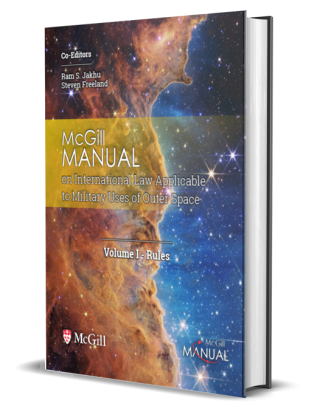
***The McGill Manual on International Law Applicable to Military Uses of Outer Space: Volume I - Rules is now published***
Through a dedicated website, we invite members of the public to share their relevant comments, perspectives and views, particularly on the practice of States, relating to the 52 Rules of the world’s first manual clarifying international law applicable to military uses of outer space. These comments will be duly considered for inclusion in the Commentaries on the Rules that are being worked on. This process of public consultation will be of added value to the McGill Manual: Volume II - Rules with Commentaries (forthcoming with Springer).
A positive set of rules, [...] if they are judicious [prevents] the unchaining of passion and savage instincts -- which battle always awakens, as much as it awakens courage and manly virtues, -- it strengthens the discipline which is the strength of armies; it also ennobles their patriotic mission in the eyes of the soldiers by keeping them within the limits of respect due to the rights of humanity.
— Gustave Moynier, co-founder International Committee of the Red Cross
Launched in May 2016, the Manual on International Law Applicable to Military Uses of Outer Space (MILAMOS) Project aims to develop a widely-accepted manual clarifying the rules applicable to the military use of outer space by both States and non-State actors. These rules would govern and regulate activities that can be conducted in times of peace, as well as in periods of tension and armed conflict. Such ideas build on the consensus of a panel of international experts who took part in the Expert Roundtable on International Law Applicable to Military Activities in Outer Space, which was convened at McGill in 2015.
Such a manual will clarify the limitations international law places on the threat or use of force in outer space. It aims to look at how, against the backdrop of rapidly developing technologies and applications, what military uses and objects are considered lawful or outrightly prohibited in outer space.
Recent history suggests that non-governmental efforts to clarify the application of the law of armed conflict to new domains and means and methods of warfare are more successful than attempts influence State behaviour.  An international and independent group of experts working together to agree upon a set of rules is able place constraints on State behaviour and shape the legality of State action. The process and success of the San Remo Manual on International Law Applicable to Armed Conflict at Sea, the Harvard Manual on International Law Applicable to Air and Missile Warfare, and the Tallinn Manual on International Law Applicable to Cyber Warfare demonstrate how international experts and engagement with governments have managed to produce quasi-legal documents that enjoy widespread recognition and authoritativeness. These manuals enjoy the endorsement of the International Committee of the Red Cross, which is committed to initiatives that reduce unnecessary human suffering and wanton destruction during armed conflict. The evident success of these manuals supports the conclusion that MILAMOS should be drafted and made available to provide an important framework governing any military activities in the space domain.
An international and independent group of experts working together to agree upon a set of rules is able place constraints on State behaviour and shape the legality of State action. The process and success of the San Remo Manual on International Law Applicable to Armed Conflict at Sea, the Harvard Manual on International Law Applicable to Air and Missile Warfare, and the Tallinn Manual on International Law Applicable to Cyber Warfare demonstrate how international experts and engagement with governments have managed to produce quasi-legal documents that enjoy widespread recognition and authoritativeness. These manuals enjoy the endorsement of the International Committee of the Red Cross, which is committed to initiatives that reduce unnecessary human suffering and wanton destruction during armed conflict. The evident success of these manuals supports the conclusion that MILAMOS should be drafted and made available to provide an important framework governing any military activities in the space domain.
It is our firm belief that this unique and innovative project will have a positive impact and influence on the future and sustainability of humankind’s ventures in outer space. Against this backdrop, under direction of founding institution the McGill Centre for Research in Air and Space Law (CRASL), a dedicated, international and interdisciplinary team of experts will together to develop a Manual of International Law Applicable to Military Uses of Outer Space (MILAMOS).
To date, the MILAMOS Project has attracted extensive international attention and media coverage.
For more information, please visit our dedicated McGill Manual website.